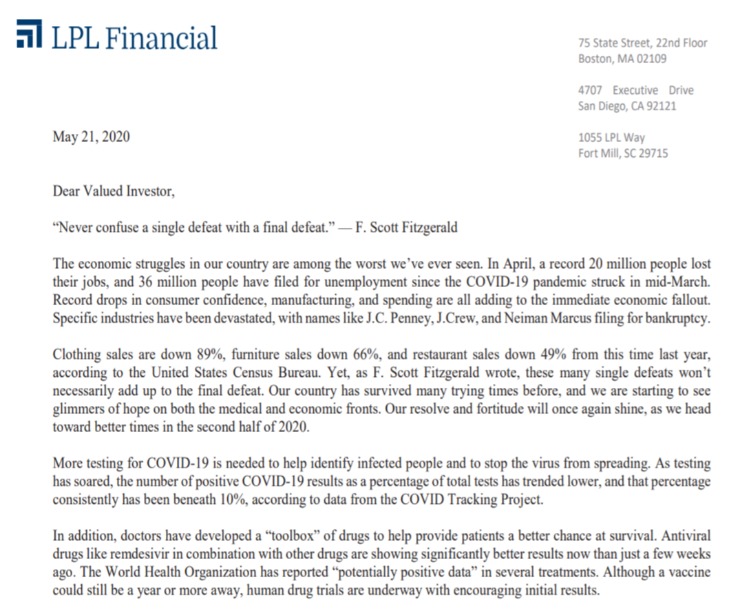Dear Valued Investor,
“Never confuse a single defeat with a final defeat.” — F. Scott Fitzgerald
The economic struggles in our country are among the worst we’ve ever seen. In April, a record 20 million people lost their jobs, and 36 million people have filed for unemployment since the COVID-19 pandemic struck in mid-March. Record drops in consumer confidence, manufacturing, and spending are all adding to the immediate economic fallout. Specific industries have been devastated, with names like J.C. Penney, J.Crew, and Neiman Marcus filing for bankruptcy.
Clothing sales are down 89%, furniture sales down 66%, and restaurant sales down 49% from this time last year, according to the United States Census Bureau. Yet, as F. Scott Fitzgerald wrote, these many single defeats won’t necessarily add up to the final defeat. Our country has survived many trying times before, and we are starting to see glimmers of hope on both the medical and economic fronts. Our resolve and fortitude will once again shine, as we head toward better times in the second half of 2020.
More testing for COVID-19 is needed to help identify infected people and to stop the virus from spreading. As testing has soared, the number of positive COVID-19 results as a percentage of total tests has trended lower, and that percentage consistently has been beneath 10%, according to data from the COVID Tracking Project.
In addition, doctors have developed a “toolbox” of drugs to help provide patients a better chance at survival. Antiviral drugs like remdesivir in combination with other drugs are showing significantly better results now than just a few weeks ago. The World Health Organization has reported “potentially positive data” in several treatments. Although a vaccine could still be a year or more away, human drug trials are underway with encouraging initial results.
In the face of the devastating loss of human life and historically weak economic data, however, the S&P 500 Index has experienced one of its greatest short-term rallies ever, up more than 30% from the March 23 lows at its recent peak. Based on historical trends, we anticipate a warranted correction in stocks over the coming months. Stock valuations are historically expensive, tensions are building between the United States and China, the stock market’s momentum is showing signs of waning, and we’re entering the historically weak summer months—all of these are reasons to be alert.
History bears this out. All major S&P 500 bear markets in the past 60 years had a significant bounce off the market lows, followed by a correction of about 10% on average before another surge higher. Based on this historical trend, a market correction of 8–12% after the recent big rally may be likely over the coming months.
While current economic data may sound bad, it’s important to remember it is backward-looking. Real-time economic data points such as public transportation, traveler data from the Transportation Security Administration, fuel sales, railroad traffic, and federal tax withholding are all showing improvement as the economy begins to re-open.
Finally, small businesses are the lifeblood of the US economy, and the Bureau of Labor Statistics shows they employ 47% of all private sector jobs. Recent data showed small businesses are as optimistic about the next six months as they’ve been in 18 months, suggesting the worst may be behind us, and a growing demand for their products and services could be brewing. The pain from this recession is impacting all of us, but better times are coming.
Stay safe, and please contact your financial professional with any questions.
Click here to download a PDF of this report.
This material is for general information only and is not intended to provide specific advice or recommendations for any individual. There is no assurance that the views or strategies discussed are suitable for all investors or will yield positive outcomes. Investing involves risks including possible loss of principal. Any economic forecasts set forth may not develop as predicted and are subject to change.
References to markets, asset classes, and sectors are generally regarding the corresponding market index. Indexes are unmanaged statistical composites and cannot be invested into directly. Index performance is not indicative of the performance of any investment and do not reflect fees, expenses,or sales charges. All performance referenced is historical and is no guarantee of future results.
All index data from FactSet.
All information is believed to be from reliable sources; however, LPL Financial makes no representation as to its completeness or accuracy.
This research material has been prepared by LPL Financial LLC
Securities and advisory services offered through LPL Financial (LPL), a registered investment advisor and broker-dealer (member FINRA/SIPC). Insurance products are offered through LPL or its licensed affiliates. To the extent you are receiving investment advice from a separately registered independent investment advisor that is not an LPL affiliate, please note LPL makes no representation with respect to such entity
Not Insured by FDIC/NCUA or Any Other Government Agency | Not Bank/Credit Union Guaranteed | Not Bank/Credit Union Deposits or Obligations | May Lose Value
Tracking # 1-05012842 (Exp. 05/21)
